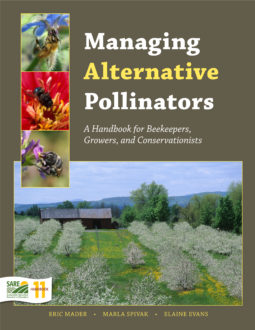Agricultural practices like crop rotation and the use of resistant crop varieties can reduce the need for pesticides. Monitoring fields for actionable levels of activity rather than routine scheduled spraying is also advised. These are some of the basic strategies of integrated pest management (IPM), a philosophical approach to reducing pesticide use. IPM employs biological and cultural tools in addition to chemicals for the control of crop pests. The objective is to reduce crop damage while still protecting the environment—including beneficial insects like bees. Every agronomic and horticultural crop has industry standard IPM guidelines. You should be familiar with the most current recommendations for your particular crop.
Managing Alternative Pollinators
Reducing Pesticide Use
SARE Outreach
| 2010 | 158 pages
PDF (5.0 MB)
or call (301) 779-1007 to order.
